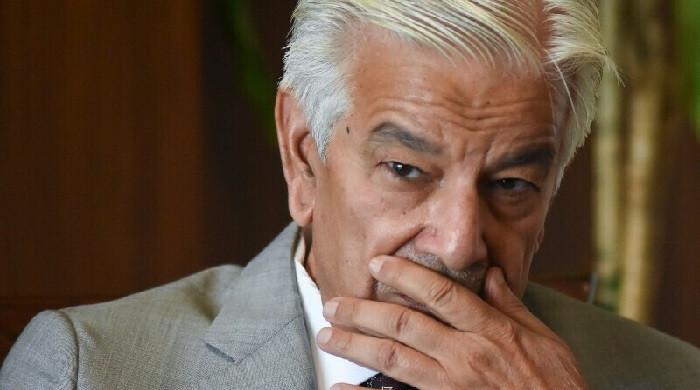- Accuses the Modi Chaleur Government focused on elections.
- Warns India “devastating consequences” in any mishap.
- Said that Pakistan’s response will be fast, decisive and unforgettable.
Defense Minister Khawaja Asif responded early on Sunday to what he described as provocative statements for the best security establishment in New Delhi, saying that India would be “buried under his war planes, Inshallah”.
In an article on X, the Asif described the recent comments of the military and political leaders of India as an unsuccessful attempt to restore their lost credibility. He said their statements have shown pressure at the top.
“After such a decisive defeat of 6-0, if they try again, the [Pakistan’s] The score will only improve, “wrote the minister. He added that public opinion in India had turned against the ruling party after this defeat, and this was reflected in the words of the leaders.
The Minister of Defense also said: “Pakistan is a state built on behalf of Allah, our defenders are soldiers from Allah. This time, India, Inshallah, will be buried under the wreck of its planes. Allahu Akbar. “
Earlier, the army spokesman also reacted to the same remarks of Indian security circles.
Responding to the rhetoric of the war of India, the country’s armed forces warned that the “provocative and jingoisetic remarks” of senior Indian security officials may make pretexts for aggression and could lead to “cataclysmic devastation”.
Inter-service public relations (ISPR) said that such comments suggested a renewed attempt to make arbitrary pretexts for the aggression that would have serious consequences for peace and stability in South Asia “.
One day earlier, the head of the Indian Air Force, Amar Preet Singh, said India had shot five Pakistani fighter planes in the F-16 and JF-17 class during the intense fights between nuclear armed neighbors in May.
“Regarding the air defense part, we have proofs of a long-range strike … With these five fighters, high-tech fighters between the F-16 and JF-17 courses, our system tells us,” Singh told journalists at the Indian Air Force press conference.
However, he provided no evidence to support his complaint.
Pakistan soldiers criticized India for a long time to present themselves as a victim while “endearing violence and perpetrating terrorism in South Asia and beyond”, saying that this story was demystified.
The ISPR added that the international community now recognizes India as “the true face of cross -border terrorism and the epicenter of regional instability”.
Referring to incidents earlier this year, the ISPR said that the Indian aggression had previously brought “two nuclear powers on the verge of a major war” and criticized Indian leadership for having apparently ignored “the wreckage of its fighter planes and the anger of the long -range vectors of Pakistan”.
On the recent comments of the Minister of Defense of India and the heads of service, the army warned that a new series of hostilities “could lead to a cataclysmic devastation”.
He also warned that Pakistan “does not hold back” and “resolutely responds, unscrupulous or restrained” if hostilities are triggered.
The statement added that those who were trying to establish a “normal news” should be aware that Pakistan has itself established a new standard of response, which will be rapid, decisive and destructive.
Regarding rhetoric on the erasure of Pakistan from the card, the ISPR said that India “must know that if the situation arrives, the erasure will be mutual”.
In addition, security sources have described the threats of India as an empty boastful. They said the armed forces were fully ready to defend the country.
The May fights, the worst between the ancient enemies for decades, have been triggered by a terrorist attack on tourists in the Pahalgam region of Jammu and Kashmir (IIOJK), which said that New Delhi was supported by Pakistan.
Islamabad denied his participation in the attack on cashmere, who killed 26 men and was the worst assault against civilians in India since Mumbai’s attacks in 2008.
After the incident, India killed several innocent civilians in attacks not caused against Pakistan for three days before the Pakistan Armed Forces recovered in defense with the successful operation Bunyan-Um-Marsoos.
Pakistan has shot down six IAF fighter planes, including three bursts and dozens of drones. After at least 87 hours, the war between the two nuclear nations ended on May 10 with a cease-fire agreement negotiated by the United States.




